- Home
- Cynthia Ozick
Art and Ardor
Art and Ardor Read online
Art & Ardor
Novels
Trust (1966)
The Cannibal Galaxy (1983)
The Messiah of Stockholm (1987)
The Puttermesser Papers (1997)
Heir to the Glimmering World (2004)
(published in the United Kingdom in 2005 as The Bear Boy)
Foreign Bodies (2010)
Shorter fiction
Envy; or, Yiddish in America (1969)
The Pagan Rabbi and Other Stories (1971)
Bloodshed and Three Novellas (1976)
Levitation: Five Fictions (1982)
The Shawl (1989)
Collected Stories (2007)
Dictation: A Quartet (2008)
Essay collections
All the World Wants the Jews Dead (1974)
Art and Ardor (1983)
Metaphor & Memory (1989)
What Henry James Knew and Other Essays on Writers (1993)
Fame & Folly: Essays (1996)
Quarrel & Quandary (2000)
The Din in the Head: Essays (2006)
Critics, Monsters, Fanatics, and Other Literary Essays (2016)
Letters of Intent (2016)
Drama
Blue Light (1994)
Miscellaneous
Fistfuls of Masterpieces (1982)
A Cynthia Ozick Reader (1996)
The Complete Works of Isaac Babel (introduction 2001)
First published in the United States in 1968
by Alfred A. Knopf, Inc., an imprint of Penguin Random House, New York.
Published in e-book in Great Britain in 2016 by
Atlantic Books, an imprint of Atlantic Books Ltd.
Copyright © 1968, 1970, 1971, 1972, 1973, 1975, 1976,
1979, 1980, 1982, 1983 and 2016 by Cynthia Ozick
The moral right of Cynthia Ozick to be identified as the author of this work has been asserted by her in accordance with the Copyright, Designs and Patents Act of 1988.
Grateful acknowledgment is made to the following for permission to reprint from previously published material:
The Jewish Publication Society of America: Remembering Maurice Samuel which is copyrighted by and used through the courtesy of The Jewish Publication Society of America.
The New York Times Company: The Loose, Drifting Material of Life, originally published as a review of The Diary of Virginia Woolf Vol. 1 © 1977 by The New York Times Company. I. B. Singer’s Book of Creation, originally published as Collected Stories of Isaac Bashevis Singer © 1982 by The New York Times Company. The Fourth Sparrow: The Magisterial Reach of Gershom Scholem, originally published as Slouching Towards Smyrna © 1974 by The New York Times Company. Reprinted by permission.
Some of the essays in this collection were originally published in the following: Commentary, Confrontation, Judaism, Midstream, Mademoiselle, Moment, Ms., The New Republic, The New York Review of Books, The New York Times, Partisan Review, and Salmagundi.
All rights reserved. No part of this publication may be reproduced, stored in a retrieval system, or transmitted in any form or by any means, electronic, mechanical, photocopying, recording, or otherwise, without the prior permission of both the copyright owner and the above publisher of this book.
10 9 8 7 6 5 4 3 2 1
A CIP catalogue record for this book is available from the British Library.
E-book ISBN: 9781786491091
Printed in Great Britain
Atlantic Books
An Imprint of Atlantic Books Ltd Ormond House
26–27 Boswell Street London
WC1N 3JZ
www.atlantic-books.co.uk
FOR ROBERT A. GOTTLIEB
esteem and love
Contents
Foreword
Justice (Again) to Edith Wharton
Mrs. Virginia Woolf: A Madwoman and Her Nurse
Diary-Keeping
Morgan and Maurice: A Fairy Tale
Forster as Moralist: A Reply to Mrs. A. F.
Truman Capote Reconsidered
Literary Blacks and Jews
Cultural Impersonation
1. Bech, Passing
2. Esau as Jacob
The Fourth Sparrow:
The Magisterial Reach of Gershom Scholem
Toward a New Yiddish
Literature as Idol: Harold Bloom
The Riddle of the Ordinary
Remembering Maurice Samuel
I. B. Singer’s Book of Creation
The Phantasmagoria of Bruno Schulz
Out of the Flames: The Recovery of Gertrud Kolmar
The Biological Premises of Our Sad Earth-Speck
Innovation and Redemption: What Literature Means
The Hole/Birth Catalogue
Justice to Feminism
1. Previsions of the Demise of the Dancing Dog
2. Literature and the Politics of Sex: A Dissent
The Lesson of the Master
A Drugstore in Winter
Foreword
I have a conscientious and responsible friend, a professor and a scholar, and also a reputable literary critic; in her heart she is a secret playwright. She wants to make things up: characters, settings, dialogues, plots. So far she has not allowed herself to begin: she is too conscientious, too responsible. Instead, she concentrates, in sober prose, on literary and historical subjects. She knows that make-believe is frivolity. She will not permit herself a descent, however alluring, into the region of the trivial. She is a writer of essays.
My own predicament is opposite. I never meant to write essays. Only once have I ever written a piece of nonfiction on purpose and for its own sake, self-propelled. The desire came on me spontaneously, long ago, just after reading George Orwell’s “Such, Such Were the Joys . . .,” a memoir of Orwell’s melancholy childhood in an English boarding school. I was then somewhere in the middle of seven fruitless years given over to the writing of a novel that was never completed. The abandoned novel was called Mercy, Pity, Peace, and Love, a line from Blake; I have always regretted the loss of those rich words. The essay-written-for-its-own-sake did get finished, however, and even published (never mind in what mutilated and fragmented form), and though my own childhood was as far from an English boarding school as can be imagined, the essay’s theme was Orwell’s: school injustice and school humiliation. For more than twenty years, the essay and the novel have shared a cardboard box in some unremembered attic corner.
If all this carries with it an elegiac air, it is because I learn from it that volition is not always the robust master of Self we expect it to be. What we think we are surely going to do, we don’t do; and what we never intended to do, we may one day notice that we have done, and done, and done. Consequently, except for the drive—once—to mimic Orwell (and who can mimic Orwell?), I see, after two decades of never intending it, that I have written over one hundred essays—some in the form of articles or fugitive pieces; others to serve a public occasion (a talk at a conference, for instance); three or four, out of political necessity, as forays into advocacy journalism (“artists and writers,” Chekhov said, “should engage themselves in politics only enough to protect themselves from politics”); the rest an outgrowth of reading and reviewing. (Reading to save one’s life is almost always private.) Of these hundred and more, all were instigated or invited. The stimulus was inevitably external. But if “invited” has the sound of welcome, that is by and large a misrepresentation of struggle and scramble. Most of the hundred were written catch-as-catch-can, out of unashamed print-lust, in the absence of what is usually called a “platform.” They were written on quicksand, without a place to stand: no regularly supportive periodical, no professorship, no body of learning, no assurance, no early mark made for oneself; every start a new start; walking round a thoug
ht—an assigned, appointed, prescribed, imposed thought—as if it had dropped from the sky in need of pristine examination. The hundred were mainly written as spurs pressed hard in the dark, in response to an occasional summons from a chance voice. What was that summons? Print; and the sure knowledge that print is often chance.
All the same, essays seem a deviation, a diversion: the region of the trivial, no matter how momentous the subject. We can speculate why. Essays summarize. They do not invent. In undertaking the writing of an essay (or article, or “piece,” and most particularly in journalism), I know beforehand what I think. I see the end, it is all the while uncompromisingly, inflexibly, in sight, and my task is to traverse the space between. The risks are small. The way is predictable. It is a journey of obligation within borders, not an adventure. But in beginning a story I know nothing at all: surely not where I am going, and hardly at all how to get there. In a story, one cannot guess what lies at the close of the sentence, much less any wider goal or climax or resolution. Yet the resolution always miraculously rises to organize itself and everything around it. Fiction is all discovery; discovery plotted—fallen into, rather—by character: first the writer’s, and only then the characters’. Even failure is worthwhile—so much has been dared: scaling an edge to find out something “new,” “true”—inherent, immanent, encoded—that was unsuspected at the start, and by the end seems both ingenious and right. No essay carrying its bundle of information, subject matter, “field,” theme, argument, intent, no essay carrying its armful of context, point of view, explicit history and explicit culture, can equal that. Essays know too much.
Except sometimes. Knowledge is not made out of knowledge. Knowledge swims up from invention and imagination—from ardor—and sometimes even an essay can invent, burn, guess, try out, dig up, hurtle forward, succumb to that flood of sign and nuance that adds up to intuition, disclosure, discovery. The only nonfiction worth writing—at least for me—lacks the summarizing gift, is heir to nothing, and sets out with empty pockets from scratch. Sensibility (or intellect, or susceptibility) is most provoked when most deprived of scaffolding; then it has to knot sheets for the climb. A number of essays included here began without the freight of preconception. Whether or not they are serviceable or poor examples of thinking is something the reader will determine. But in the writing they felt, for the most part, as much scouted and discovered as stories themselves. And that, I think—in an era when the notion of belles-lettres is profoundly dead, and when the capacious idea of the person-of-letters who can take on a range of available forms is no more than a legendary glimmer—that can be the only justification for their having been written at all.
C. O.
Art & Ardor
Justice (Again) to Edith Wharton
Nearly forty years ago, Edmund Wilson wrote a little essay about an underrated American novelist and called it “Justice to Edith Wharton.” She was in need of justice, he claimed, because “the more commonplace work of her later years had had the effect of dulling the reputation of her earlier and more serious work.” During this last period—a stretch of about seventeen years, from (roughly) 1920 to her death in 1937—Edith Wharton’s novels were best sellers, her short stories commanded thousands of dollars; but both in mode and motivation she remained, like so many others in the twenties and thirties, a nineteenth-century writer. She believed in portraying character, her characters displayed the higher values, her prose was a platform for her own views. In 1937, when Wilson undertook to invigorate her reputation, the machinery of nineteenth-century fiction was beginning to be judged not so much as the expression of a long tradition, or (as nowadays we seem to view it) as the exhausted practice of a moribund convention, but more bluntly as a failure of talent. Wilson accounted for that apparent failure in Edith Wharton by speculating on the psychological differences between male and female writers:
It is sometimes true of women writers—less often, I believe, of men—that a manifestation of something like genius may be stimulated by some exceptional emotional strain, but will disappear when the stimulus has passed. With a man, his professional, his artisan’s life is likely to persist and evolve as a partially independent organism through the vicissitudes of his emotional experience. Henry James in a virtual vacuum continued to possess and develop his métier. But Mrs. Wharton had no métier in this sense.
What sort of “justice” is this? A woman typically writes best when her emotions are engaged; the barren female heart cannot seize the writer’s trade? Only a decade ago, such a declaration would have been derided by old-fashioned feminists as a passing insolence. But even the satiric reader, contending in one fashion or another with this passage, would have been able, ten years ago, to pluck the offending notion out as a lapse in the texture of a measured and generally moderating mind.
No longer. Wilson’s idea returns only to hold, and it holds nowhere so much as among the literary proponents of the current women’s movement: Wilson’s lapse is exalted to precept. The idea of Edith Wharton as a “woman writer” in need of constantly renewable internal stimuli, whose gifts are best sustained by “exceptional emotional strain”—all this suits the newest doctrine of sexual exclusiveness in literature. Indeed, one of the outstanding tenets of this doctrine embraces Wilson unrelentingly. “Rarely in the work now being written by women,” according to an article called “Toward a Definition of the Female Sensibility,”
does one feel the presence of writers genuinely penetrating their own experience, risking emotional humiliation and the facing-down of secret fears, unbearable wisdoms . . . There are works, however, . . . in which one feels the heroic effort stirring,1
and there follow numerous examples of women writing well because of the stimulus of some exceptional emotional strain.
Restitution, then (one supposes), is to come to Edith Wharton not from the old-fashioned feminists, but from the newer sort, who embrace the proposition that strong emotion in women, emotion uniquely female, is what will best nourish a female literature. What we are to look for next, it follows, is an ambitious new-feminist critical work studying Wharton’s “vicissitudes of . . . emotional experience” and correlating the most fevered points with the most accomplished of the fictions.
Such a work, it turns out, more extensive and more supple than Wilson’s pioneer brief would suggest, has just made its appearance: Ellen Moers’s Literary Women. Like other new feminists, Moers believes that there is such an entity as the “history of women,” that there are poetic images uniquely female; and even “landscapes charged with female privacy.” She writes of “how much the freedom and tactile sensations of near-naked sea bathing has meant to modern women,” and insists that a scene recounting the sensation of walking through a field of sea-like grass provides that “moment when Kate Chopin reveals herself most truly a woman writer.” Edith Wharton’s life—a buried life—ought, properly scrutinized, to feed such a set of sympathies, and to lure the attention of restitution. Literary Women, after all, is conceived of in part as a rescue volume, as a book of rehabilitation and justice: a number of writers, Moers explains, “came to life for me as women writers as they had not done before. Mrs. Gaskell and Anne Brontë had once bored me; Emily Dickinson was an irritating puzzle, as much as a genius; I could barely read Mary Shelley and Mrs. Browning. Reading them anew as women writers taught me how to get excited about these five, and others as well.”
Others as well. But Edith Wharton is omitted from Literary Women. Her name appears only once, as an entry in an appendix. Only The House of Mirth is mentioned there, along with a reference, apparently by way of explanation of the larger omission, to the chapter on Edith Wharton in Alfred Kazin’s On Native Grounds. Pursuing the citation, one discovers that Kazin, like Wilson, like the new feminists, speaks of “the need that drove her to literature.” Whatever the need, it does not engage Moers; or Kazin. He advances the notion that “to Edith Wharton, whose very career as a novelist was the tenuous product of so many personal maladjustments, the n
ovel became an involuted expression of self.” Unlike the new feminists, Kazin will not celebrate this expression; it represents for him a “failure to fulfill herself in art.” Wharton, he concludes, “remains not a great artist but an unusual American, one who brought the weight of her personal experience to bear upon a modern American literature to which she was spiritually alien.”
Justice to Edith Wharton: where, then, is it to come from? Not taken seriously by the dominant criticism, purposefully ignored by the radical separatist criticism of the new feminists2—she represents an antagonism. The antagonism is not new. Wharton describes it herself in her memoir, A Backward Glance:
My literary success puzzled and embarrassed my old friends far more than it impressed them, and in my own family it created a kind of constraint which increased with the years. None of my relations ever spoke to me of my books, either to praise or blame—they simply ignored them; and among the immense tribe of my cousins, though it included many with whom I was on terms of affectionate intimacy, the subject was avoided as if it were a kind of family disgrace, which might be condoned but could not be forgotten. Only one eccentric widowed cousin, living a life of lonely invalidism, turned to my novels for occasional distraction, and had the courage to tell me so.
She continues: “At first I felt this indifference acutely; but now I no longer cared, for my recognition as a writer had transformed my life.”
So it is here—in this uplifting idea, “my life,” this teleological and novelistic idea above all—that one will finally expect to look for Wharton’s restitution “as a writer.” The justice that criticism perversely fails to bring, biography will achieve.
Perhaps. The biography of a novelist contains a wonderful advantage: it accomplishes, when well executed, a kind of mimicry. A good biography is itself a kind of novel. Like the classic novel, a biography believes in the notion of “a life”—a life as a triumphal or tragic story with a shape, a story that begins at birth, moves on to a middle part, and ends with the death of the protagonist.

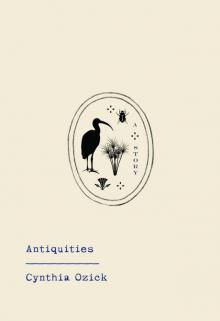 Antiquities
Antiquities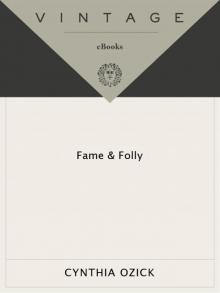 Fame & Folly
Fame & Folly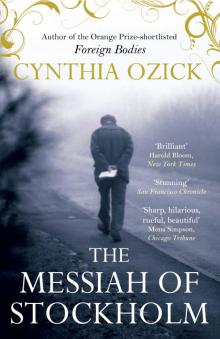 The Messiah of Stockholm
The Messiah of Stockholm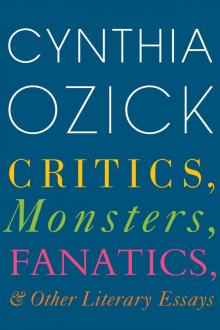 Critics, Monsters, Fanatics, and Other Literary Essays
Critics, Monsters, Fanatics, and Other Literary Essays Heir to the Glimmering World
Heir to the Glimmering World The Din in the Head
The Din in the Head Dictation
Dictation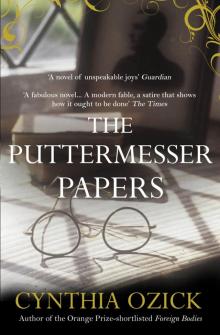 The Puttermesser Papers
The Puttermesser Papers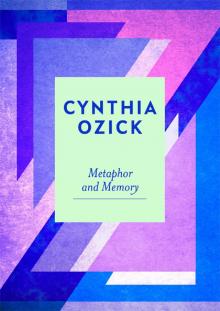 Metaphor and Memory
Metaphor and Memory Art and Ardor
Art and Ardor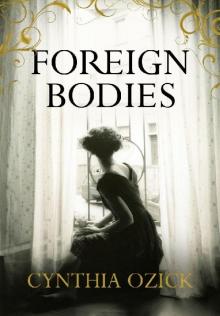 Foreign Bodies
Foreign Bodies Quarrel & Quandary
Quarrel & Quandary